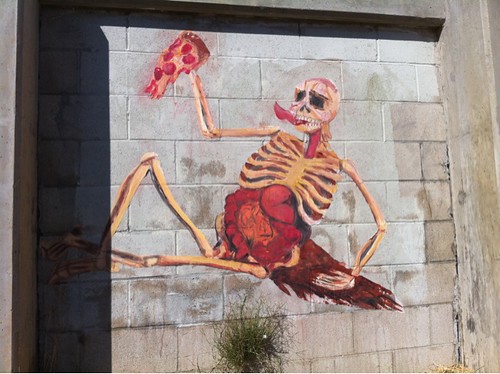I was munching on a sandwich at one of my favorite local eateries reflecting on the random small accomplishments we often make during our off-track or vacation time. For some finishing recording an album, an early start on lesson planning, perhaps housecleaning long postponed. For me, I’m basically entrenched in pages of dissertation proposal writing. However, that hadn’t stopped me from setting goals regarding trying new cooking recipes, sketching out more time for creative writing, and making a dent in the to-read book heap (that continues, to this day, to grow like the weeds and wildflowers that pester the hedges and front garden of my apartment – perhaps another domestic area that should be added to the list of goals for the remaining month and change). In any case I realized there is something else I want do: I want to listen to an album.
No, not any album mind you – I mean I’ve got plenty to choose from (too many, depending on whom you ask). Specifically, I realized I wanted to listen to Zaireeka.
Released in 1997 by the Flaming Lips, Zaireeka is a four CD album – no, it’s not some epic prog-rock behemoth that goes on for hours. Instead of playing the four discs consecutively, Zaireeka requires – at least to be heard “properly” – for all of the disks to be played concurrently. This, for several obvious reasons poses a considerable challenge. For starters, I don’t actually own four separate CD players (fine, with a couple of laptops, I suppose I do, but who wants to listen to the album through paltry computer speakers?). Secondly, the act of trying to sync and play four CDs simultaneously isn’t the easiest skill to muster.
To be clear, I think these challenges are my favorite part about the album. Since first purchasing my copy around a decade ago, I’ve only listened to the album twice. Yes, there are mixed-down versions pirated and readily available for download, but that defeats the experience – defeats the very idea – of Zaireeka.
Listening to the album becomes an event. Like today’s remix culture in which the lines of consumption and production are reversed, flipped, thrown out the window, Zaireeka predicts the relationship between artist and fan years before the (problematic) phrase “Web 2.0” ever traipsed out of Tim O’Reilly’s lips. At the same time, the conveniences of new media that make remixing and social interaction so easy for most today are utterly beyond the unwieldy challenge of playing four CDs together. You can’t listen to Zaireeka easily by yourself – you can’t slip on headphones and add it to your favorite playlist as you drive to work, shuffle around the grocery store, or walk the dog. It is a community event, one that is to be experienced as a group, even more so than a concert.
Having dinner with a friend recently, she mentioned the sense of feeling alone in a concert. Zaireeka is the frame for establishing and creating a non-digital social network; it is a network where participation and interaction is key. We laugh, nod along, and giggle at the odd noises and melodies that Wayne Coyne and co. enact with us.
I also like the notion that the process of participating with the album can utterly and beautifully fail. I remember on the two occasions I’ve tried listening to the album the numerous false starts and failed attempts to get the discs to correctly sync. It was a learning process and one that was bolstered by the shared interest in making the album “work.” The Flaming Lips were counting on us, after all.
Shortly after setting my sites on setting up a listening party for the near future, I found out that the 33 1/3 book series published a small tome on the landmark album. The book is a fun description and contextualization of the book. Like this post’s musings on the album, little groundbreaking revelation is offered about the album, but for fans of the Lips, it’s a text I found entertaining. The author, Mark Richardson, points out that recording for Zaireeka coincided with production for the critically lauded Soft Bulletin. Opening with the sweeping orchestrations describing “Two scientists […] racing for the good of all mankind,” the album’s hopeful exuberance captures best the delicate and boisterous act of becoming a co-creator and acting out another performance of Zaireeka.

I remember fondly sitting around our living room floor with four different CD players of varying quality (and greatly varying “start-up speeds”) as we tried to sync up the discs and listen. It became scientific as we tried to figure out which player would take that extra half-second to start from pause and would decide to push the play button a half-count earlier on the large stereo and a half-count later on the small boombox.
I know I will be the party-pooper / tech-geek on this, but using recording software, I can mix you an album with all four discs synced perfectly. I think this will be my next project to share with you and Chris.
I want in on the listening experience and can provide one CD player with non-compromising highs and accompanying subwoofer for floor rumbling lows. Time and date?
the other day i bought a pocket sax (yes i will have to show you) what if the next album you bought was played in one key that could easily be accompanied by a small inexpensive instrument that the consumer could play along with the album, improvising new solos and key parts to the music… it could even be a kazoo…
but the real question is, WHY didn’t WE finish recording an album during our off track time?!??!?!